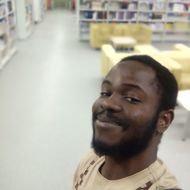Being Black in Russia: A Sincere Opinion

This is a personal story written for black students, for all students. It is also written for me, to keep the hope alive and to open my heart to all the numerous experiences that HSE University has to offer. Some of them are demanding and some, challenging, but with a simple aim, to prepare their students for a competitive world.

Daniel Onyekachukwu Akabueze,
Political Science and World Politics Program student
Have you been in a place where you are very different? You speak differently, look different, and have different perspectives about things. Have you tried to connect with a place or a system of doing things and find it absolutely difficult to do so? Have you tried to do things, and become ambivalent about it, not because anyone is against you, but because you seem not to really fit in and you are not sure whether you really want to. There is a way to be and to do, that way seems so foreign, so unrealistic, so performative. The performative is about you, not actually the state of things or people. How can you possibly be? You have spent all your life in Nigeria. You have played on dusty roads or sat under the mango tree or under the udara tree. You smelled the moistness of sand when it started raining, and your mother screamed at you for dirtying yourself. You attended Patriotic Primary School, Rock of Ages Secondary School and Michael Tansi Memorial Secondary school. You spoke English that was mixed with Igbo. You spoke with a Nigerian accent. You are not British or American. You are black. You know you’re black because there are Oyibos or ndi ocha. But you have not thought of yourself as black, because there is no need to. Most people are black.
But now, you haven’t seen Mango or Udara and the dusty road in Zaporozhaskaya is different from the ones back home in Nigeria. People play in the snow. You don’t know how to do that. You will later see children playing in the snow as you’re going back to the dormitory, falling down, pushing themselves down, smiling, conversing, speaking Russian. You will watch their mother smile. A tender smile. A smile that was both of pride and nostalgic feeling of childhood. They will slowly stare at you as you walk past them with your heavy laptop bag and one of the kids will smile. You will smile back. You love kids but you are not sure what to do with some of the lovely kids you see everyday. Should you tickle their cheeks? Should you say Hi to them? You don’t know.
Much later, you will tell a classmate about a kid you met inside the train, and whose picture you later took. And the classmate will stare at you like you have gone nuts.
“You did that?” he will ask you.
“Yes.”, you will reply.
“No, you don’t do that. He will go on to tell you how their parents may not be happy about that and how that might lead you into trouble.”
He was right. You’d think. Would you end up in jail for doing that? But you’d later wonder if he was right that taking photos of kids or playing with them might land you into trouble. Maybe he was. That is how to be. That is the reality. Your new reality. The reality you are supposed to live with for the next four years. It was different from your reality in Nigeria. But you don’t complain. That is how to be in Russia. That is how to be in Russia as an international student. Most times, you would wonder if there are layers to this how to be. Maybe, this is your personal experience as a student from Nigeria studying Political Science and World Politics at HSE. A school you love and adore.
Your first day to physically attend a class, it was a “Category of Political Science” lecture. The lecture hall was almost filled before you entered. It was Room 401 at Griboyedova building. You flew in from Lagos to Moscow just two days ago and your roommate had taken you to the bank to open an account and to the university building where you would be studying. He explained how you could maneuver through the metro. When you both enter the long University building, with a cafeteria on the ground floor, he will tell you to keep your jacket, and you'd worry whether people didn’t take it before you return.
“Jackets are kept here”, he said.
“You don't take them inside the class, because professors don't like it.”
Your worry was losing your dark blue winter jacket, which your roommate will touch later and tell you that it was not strong enough to keep you through the winter. That you will need to buy another jacket and boots to wear them with worm socks. You will be surprised as your roommate tells you that the cold you’re feeling was just autumn coolness and not winter. You will be worried about the announcement. You were shivering and someone was still telling you that something you were feeling was not cold yet.
As you entered the class that morning, you looked around with style, maintaining your firmness. You’re the only black student in class. You fear because of that discovery and then you will tell yourself that school has just begun and with time other students that look like you will come. You waited for one week. Then two weeks. Then three. There was no one. It was on the fifth week that someone said in the telegram chat created by your classmate that she was from Africa. Really? You were surprised and relieved. Why haven’t you seen her in class. You will check her displayed picture and discovered that she was nothing like you. She was from Algeria. She was white. You are black. She was long haired, but your kinky hair could not form ponytail. You did not get to speak to her as you would later realize that she was no longer a student of your program. Then, you braced up to take this journey alone, connecting with your classmates academically, but wide in reality.
But increasingly, you will start thinking about this opportunity extended to you to study in Russia. What does it mean? What is your duty and your responsibility? You know you cannot relax. What does it mean to be black in Russia? You’re a person of color from a place that is ravaged by the British colonialists. You know that your story has been hijacked, and told by others in such a dubious paternalistic manner. You know that someone has taken the claim and written so self-importantly that he discovered Africa. You know that Mungo Park has been credited for discovering River Niger, the longest River in Nigeria and one of the longest on the continent. You know that those stories that others have told about you are not just stupid, untrue and senseless, but they are hurtful in a clear way that lies can hurt. You know that Nigerians from a place that would later be known as Delta, have been living around Niger and using their canoe to fish. So how could Mungo Park possibly discover River Niger? How could someone claim to have discovered what has been in existence for years? You know that coming to Russia and studying this particular course will enable you to know better, to think better and to disagree with those senseless, aged stories.
HSE University gave you access to many articles. You will read them. You will, sometimes, laugh at those articles. You will know that some of the statistics used most times do not represent you. You will disagree with them in class. Discuss them with some of your classmates. At least you had given them an opportunity to see Africa beyond statistics and map. To see the continent as containing people with different cultures, different ways and different belief systems. You will teach other young Nigerians online either in your writing class or through other social media platforms to reject the unbecoming narratives and negative stereotypes about Africa.
You also know that some of the narratives are true. Moreover, you will stay in the study room thinking about some of the problems and what your contribution can be in solving some of the problems in Nigeria. You will discuss them with your friends. When people complain about unstable electricity, you will tell them to think about what they can do to solve that problem. Being black in Russia is to know and to think. TO LEARN THE BETTER WAYS TO DO THINGS. When one of your classmates asks a teacher not to use a particular philosopher as an example during one of your classes, and the teacher instead of walking him out of the class with the aim of dealing with him afterwards, rather starts discussing or arguing with you, which is a surprise. You will learn later that what is being done in Nigeria’s universities where students must agree with their lecturer is just a crap, a very silly approach to learning. You will learn that debates are very good to broaden ideas. You will think about how to have young people under your influence in Nigeria to imbibe the virtue of debating and disagreeing as a means of learning. You know it will be difficult. You disagreed with your friend about gender and feminism. Wanting him to see that we should pursue equality of gender, but he got offended. Nevertheless, you realized something much later. Your approach was bad. It was not fully what happened in that particular class, on that particular day. You tried imposing your thoughts and your opinions on your friend. You felt bad, but decided to keep trying. You learnt that public transport could work and work well. You had spent time trying to figure out how the underground transport system was built. Although you know that some of your thoughts might not be entirely implemented. The light has been ignited in your heart. You are becoming sure and better and even more determined to bring change.
To be black in Russia is to be thrown into a new way of being and doing things. To struggle to be. To learn, unlearn and relearn. It is also to tell your story by yourself and in your way. To be black in Russia is to grow and to grow well. It is to be given access to free Wi-Fi, which will enable you to use the Internet to learn without charges. You know that the free internet access can be a distraction if you’re lacking self-discipline. It is to be given the tool to prepare to contribute towards the change in your country. These tools aren’t physical. These tools aren’t just academic curriculum and political ideologies. These are interactions made in class by your fellow students, as their various ideas struck you. These are the gothic architectures that beautified the City of Saint Petersburg. These are the timed rides on the metro trains, where you arrive at a place without delay, or in Nigerian terms, go-slow. These are informal conversations you have with your professors and you are touched by their warmth and openness, their curiosities and their willingness to help. Use that tool. Use it courageously and fiercely. For that is the real growth and the real change, and that is what being black in Russia is all about for me.
Shared by

